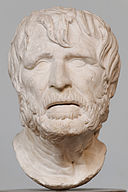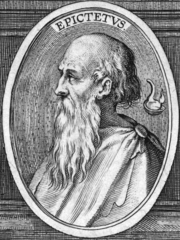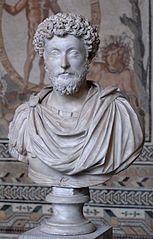
Stoicism was one of the most influential philosophies of the Hellenistic Age. It was originally founded in Athens by Zeno of Citium (344 – 262 BCE), a Cypriot who chose to devote his life to philosophy after being inspired by the great philosopher, Socrates. The term “stoicism” comes from the Greek word “stoa poikilê” which refers to the “painted porch” in the agora – a public meeting place in Athens where Zeno’s lectures were held.
To the stoics, philosophy was not just a theoretical discipline; it was a way of life. They believed that all worldly events were predetermined and therefore beyond man’s control. To achieve happiness, individuals had to learn to live in harmony with this predestined nature, and develop an ability to react to events in the right way.
After the Hellenistic empire collapsed, and the Greek city-states came under Roman rule, Greek ideas flooded the Roman world. Stoicism was by far the most popular of the Greek philosophies and was adopted as the main philosophical school of the Romans. Although eventually eclipsed by the rise of Christianity, the term “stoic” has survived today to refer to someone who is able to endure pain or suffering without showing their emotions.
None of the works of Zeno or other Greek stoic philosophers, such as Cleanthes and Chrysippus, have survived intact. The only complete works available to us today are by stoic thinkers of Imperial Roman times:

Lucius Annaeus Seneca (circa 4 BC – AD 65) was born in Cordoba (the leading town in Roman Spain) and educated in Rome, where he became a leading speaker in the Senate. In 48 AD he became the tutor to the future Roman Emperor, Nero and later, was one of his principal advisers.
The early years of Nero’s reign are generally regarded as a period of good government, and this early success is often attributed to Seneca who held a great deal of influence over the young emperor. Over time, however, Seneca’s power waned, and in 62 AD he sought permission to retire from public life. Just three years later, Seneca was charged with participating in a conspiracy to murder Nero. While he denied the charges, he had by this point fallen out of the Emperor’s favour and Nero ordered him to commit suicide (the primary method of imperial execution at the time).
Seneca’s most famous and widely read works are his Letters to Lucilius which he wrote near the end of his life. They contain much practical wisdom – on death, on mercy, on happiness, and on coping with life’s setbacks – and illustrate many of the ideals of stoicism.

Epictetus (circa 50 – 135 AD) was a Greek slave who lived a portion of his life in Rome, serving the court of the emperor, Nero. After receiving his freedom, he became a respected teacher of stoic ethics, establishing his own school at Nicopolis in Northwest Greece. His brand of stoicism is detailed in his Discourses – an account of his teachings written by one of his pupils, Arrian. An abridged version of his teachings are also available in the Enchiridion (which means “manual” or “handbook” in English).
A central theme of the Discourses is what it means to be a human being. To Epictetus, the characteristic that separates humans from animals is our capacity of choice – our ability to make our own decisions. The path to human happiness, he argued, lies in understanding what is within our power to change and what is not. While we may not have control over certain external events, Epictetus argued that we can use our power of reasoning to decide how best to act and respond to those events. Furthermore, he believed that humans could actively improve their own attitudes and behavioural responses through sustained self-reflection and repeated practice. In short, the powerful message of his teachings was that our happiness and well-being is essentially “up to us”.
Epictetus’s philosophical thought had a significant influence on many philosophers of the time, including the Roman Emperor, Marcus Aurelius (see below).

Marcus Aurelius (121 – 180 AD) was a stoic philosopher and Emperor of Rome from 161 AD until his death in 180 AD. During his reign, the empire was troubled by famines, plagues, natural disasters, rebellions and invasions by Germanic tribes. His most famous work, The Meditations, was written during his last military campaign on the frozen banks of the Danube. It is a series of spiritual self-reflections that he wrote without any expectation of publication, and therefore offers a unique insight into the mind of a stoic philosopher.
The Meditations is made up of 12 books and 488 chapters, although these could more accurately be described as “journal entries”, offering Aurelius’ thoughts at a particular moment in his life. Each chapter is often no longer than a sentence or two, consisting of a simple, short saying. Although pithy, these sayings contain a great deal of wisdom and cover a diverse range of topics – from death and the shortness of life, to the importance of a rational mind, and how to come to terms with what is beyond your control. As well as being considered an important work of stoic philosophy, The Meditations has been used as a source of advice for statesmen, philosophers and monarchs throughout the centuries after Aurelius’s death.



